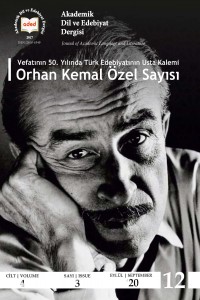Abstract
References
- Bezirci, Asım (1984). Orhan Kemal. İstanbul: Tekin Yayınevi
- Buğra, Tarık (1953), “Şive Taklidi”, İstanbul Gazetesi 1 Kasım
- Karacanlar, Yusuf Kenan (1974). Orhan Kemal. İstanbul: Tüm Yayınları
- Orhan Kemal (1963). “Gerçekçilik Üstüne”, Yelken, Kasım, İstanbul
Abstract
Orhan Kemal, in a very general sense, is a "socially realistic" novelist who takes over the naturalist and realist novel understanding that extends to Hüseyin Rahmi Gürpınar, at least in terms of presenting the case with dialogues and using accents, through the channel of novelists such as Sadri Ertem and Sabahattin Ali. The content expansion that shows itself in the form of "turning to Anatolia" in the Turkish novel, the life of young, naughty and poor young people in Orhan Kemal; workers struggling to change classes or living, small tradesmen struggles; the lives of the factory owners, who reflect the newly developing industrialization with an attitude between agility and boss; it appears as the changes that people try to shift from the peasantry to the urban workman ship. When Orhan Kemal approaches this material, he depends on the perspective of "dialectical materialism". In other words, he sees social conflicts with a "class view". However, the processing of this material is different from the "socialist realism" approach applied by some writers (egvillage novelists) who are their own contemporaries. It can be said that he is "socialist realistic" while looking at social life and choosing his material; it is "observer and critically realistic" while reflecting this material. We can say that this attitude is called "Bright realism" by Orhan Kemal.
References
- Bezirci, Asım (1984). Orhan Kemal. İstanbul: Tekin Yayınevi
- Buğra, Tarık (1953), “Şive Taklidi”, İstanbul Gazetesi 1 Kasım
- Karacanlar, Yusuf Kenan (1974). Orhan Kemal. İstanbul: Tüm Yayınları
- Orhan Kemal (1963). “Gerçekçilik Üstüne”, Yelken, Kasım, İstanbul
Details
| Primary Language | Turkish |
|---|---|
| Subjects | Literary Studies |
| Journal Section | Articles |
| Authors | |
| Publication Date | September 11, 2020 |
| Submission Date | June 9, 2020 |
| Acceptance Date | August 31, 2020 |
| Published in Issue | Year 2020 Volume: 4 Issue: 3 |
Cited By
YAZAR SÖZLÜKÇÜLÜĞÜ VE ORHAN KEMAL ÖRNEĞİ
Çukurova Üniversitesi Türkoloji Araştırmaları Dergisi
https://doi.org/10.32321/cutad.1486747
Hanımın Çiftliği üçlemesinde anlatı katmanı olarak hayaller
RumeliDE Dil ve Edebiyat Araştırmaları Dergisi
https://doi.org/10.29000/rumelide.1146587
This work is licensed under Attribution-NonCommercial 4.0 International


